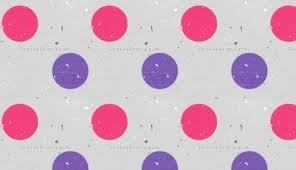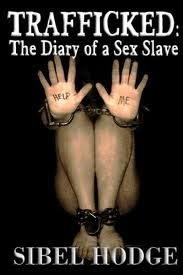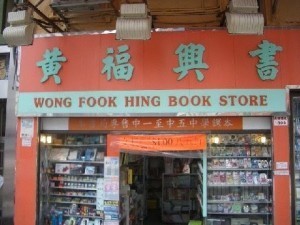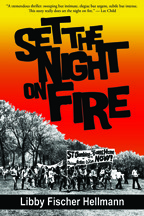Libby Fischer Hellmann's Blog, page 63
November 23, 2011
Facebook Fan Page Turkey Trot: For Free books!
Happy Thanksgiving, everyone!
Now that the turkey is in the oven, or you're drowsy from all that tryptophan, it's time to wake up and smell the fun! And the chance to download a FREE copy of ToxiCity![image error]
Maybe you've heard of a blog hop? Well I'm participating in something similar which we're calling the First Ever Fan Page Turkey Trot! You'll discover some great new FB fan pages to like and win some prizes as well. Each fan page has to do with books and reading, and is linked to other fan pages, so the idea is to trot your way through Facebook — stopping each time you find the turkey.
When you start your trot you will be directed to a fan page. Take a look around, see what interests you. Then go to the photo albums and click through until you spot the turkey. (See the image on the right) Once you find him, you'll know what to do next.*
Don't worry if you get lost, you can come back here and get this link http://vmaarten.blogspot.com/2011/11/hop-tours-express.html which lists all the fanpages .
*Some pages will give you an instant code for a free download of a book while others will direct you to enter into a drawing.
To begin all you have to do is click right here.
Happy Trotting!
November 22, 2011
Persuasion, Promotion, and Books
Hi, folks. This is going to be a long post, so go get some coffee or wine or something before you read it. OK?
Oh… and before we start, there was a happy ending to the bookseller situation last week. They decided to order all my books. I was very happy. I think they were too, because we sold out. Lovely, when that happens, isn't it? All right. Moving on now.
Persuasion is an art. It's a delicate process, and the best practitioners know you can't strong-arm it. Persuasion only works when the "persuader" is a trusted source. I know a little about it because I used to work in public relations before I started writing. A client – usually a corporation or interest group of some kind– would hire us to tell their side of a story. We'd take their money and try to get their message out. Not all publicists are created equal, nor do they all have the same persuasive skills. In fact, Rachel Maddow, someone I admire for telling it like it is, called Burson-Marsteller, the firm I used to work for, something like the "spawn of the devil." But that's another story for another time.
The key task of a publicist (and the difference between PR and advertising) is to approach a trusted source to get their client's story out. In most cases, that source is the media. Publicists pitch a story; if the media think it's newsworthy, they print, televise or broadcast that story. In that sense the media are (or used to be) a filter. A credible third-party. A gatekeeper. The important point is that no money exchanges hands in this transaction. The money stops with the PR firm. The gatekeepers don't (or never used to) take money for reporting a story.
In fact, whether the client or the media involved is liberal, conservative or pink-with-purple-polka-dots, there's no guarantee the story will be published, nor any promise that if it is, the story will feature the publicist's client. Or that the client's name will be mentioned. Even when everything works and the publicist hits it out of the park, the recipient of that story —You, the public— choose whether to be persuaded by it. It's your choice. That's the gamble every publicist takes.
Where things begin to blur is with the rise of political lobbyists, some of whom were and continue to be attached to PR firms. Over the years, increasingly large amounts of money have become involved in transactions. And the money doesn't stop with the PR firm. Money now flows through and around a PR or lobbying firm to politicians, mostly in the form of campaign contributions.
Politicians are supposed to be OUR gatekeepers, looking out for our interests and representing us by creating laws and legislation that will make our lives smoother. Except that lobbyists have are now actually crafting legislation for those politicians— legislation that protects or enhance THEIR client's fortunes, not ours. There is now a direct quid pro quo. The corporation pays, the lobbyist creates, the politician votes. You, the public, are not involved. You have no choice. You may not even benefit. It's a slippery slope that blurs the distinction between persuasion and pay-to-play politics.
Enter social media.
Now we are all about "soft" promotion and marketing. Especially when it comes to books. (You were probably wondering when I'd get to books, right?) Authors are supposed to develop relationships with our constituents (in our case, readers), make them privy to information about us, make them like us. Every publisher in the world, and every self-published author as well, knows she needs to be on Facebook, Twitter, Google+. We know we're supposed to SHARE. We are building a community of readers, book-lovers, and ideas. Engaging readers in our world.
Authors may hire publicists to help them create these soft messages. Certainly publishers do. Again, though, the money is supposed to stop with the publicist. We may have help putting ourselves and our books out into this new community. But ultimately readers see what we have to say, and either accept or reject it. Maybe they buy our book. Maybe they don't. There may be a contest or a give-away, but those are up front and in the open.
So when money becomes directly involved, (like it has in lobbying) and especially when it goes to the "new" gatekeepers of social media, the lines blur and become potentially toxic. For me, those lines are blurring. The new gatekeepers in the book industry are book bloggers, websites, and other groups that promote our books. Most bloggers are scrupulously honest, don't take money, and disclose when they've received a book from a publisher or author. Most promotional websites, too, state very clearly when and how much they charge to feature an author's books. In fact, it's the disclosure that counts. It helps readers make a more informed choice. It doesn't necessarily mean they won't buy a book if they know the promotion has been paid for. If I know an author paid to be featured on Pixel of Ink, I might buy their book anyway because I love the genre or I am taken with their sample.
It's when I don't know that the direct exchange of money – or something else — is involved that I feel used. Exploited. Foolish. Sucker-punched. And I'm feeling that way more and more.
It's not just the #FridayReads hullabaloo. At least Bethanne did try to explain. And it's not just money. It's authors trying to game the system by having friends and family write 5-star reviews on Amazon. (we've all probably done it at least once); it's authors who set up multiple Twitter accounts and follow themselves. It's groups who announce new book awards but charge authors hundreds of dollars to be nominated. It's companies charging authors fees and taking percentages of their royalties to help them self-publish and market books that the author can and should be doing themselves. It's agents who have become publishers and are therefore at odds with their client's best interests.
All of these activities weaken the fabric of social media. It makes me unsure who to trust.
Bottom line, it's the transparency, stupid. At least for me.
What do you think?
PS Happy Holidays, everyone.
November 20, 2011
Just for the holidays, a Boxed Set
I've put together a boxed set of the Georgia Davis PI series, just for the holidays. For just $5.99, you get TOXICITY, EASY INNOCENCE, and DOUBLEBACK.
I hope you'll take advantage of it. You can find it on Amazon and Nook, and within a week or so, all the other e-tailers.
How do you like the cover, btw? I'm pleased…
November 17, 2011
Just for Fun…
This has been on my computer for a long time — a friend sent it to me years ago. But since we've been talking about bookstores, I thought I'd share.
Confucius say,
If you are in a book store and cannot find
The book for which you search, you are obviously in the..
November 14, 2011
Awards — ITW Steps Up!
[image error]Some of you who've read my pros and cons post comparing traditional and e-book (self or indie) publishing know one of the sticking points for me has been book awards. Heretofore, the awards given to mysteries and thrillers have been limited to traditionally published books. Sure, there might be indie awards, but they don't have the clout or influence that the Edgars, Anthonys, Shamus, and Thriller Awards do.
Stop the presses.
The International Thriller Writers organization has changed their eligibility criteria. They have just announced a new "Best E-book Thriller" award starting in 2013. Which means from now on, authors can submit self-published e-books! Wow!
Yes, there is a caveat – the author must be an active member of ITW, which means they must have released a traditionally published book or two or ten. But this is definitely a step forward. From one of the most forward-thinking organizations in the crime fiction community.
MWA (Mystery Writers of America) also includes e-books in the Edgar awards, but they've adopted a much narrower definition of eligibility. They require that authors be published by a third-party e-book publisher. Notwithstanding individuals who will try to get around those rules by masquerading as an e-book publisher, it's really a matter of "too little too late." Who needs an e-book publisher? Doesn't that simply perpetuate the issues that are hampering publishing these days? Why should authors surrender control of their work to a third party… again? Isn't that precisely why some of us are publishing independently when we can?
So, I encourage you to lift a glass of holiday cheer to ITW. I plan to.
PS If anyone can tell me how to avoid those elongated images that appear every once in a while, I would be most grateful!
November 10, 2011
To E or Not To E: The Video
One more thing to tell you about.
Last September, I did a presentation at a Sisters in Crime event in St. Louis about traditional vs. e-publishing (self-publishing). It was videotaped, and the edited version is now on You Tube! It's only 20 minutes. It's pretty much what I said in an earlier blog about a month ago, but this time, in the flesh — so to speak. Hope you'll take a look.
November 9, 2011
Mid Week Pick-Me-Up and Win a Kindle Fire Contest
A friend e-mailed me the other day to say the cover of DOUBLEBACK was in Wired Magazine's WIRED APP GUIDE in an article about Kindles.
Of course I rushed out to find it (Thank you Barnes and Noble), and sure enough, there it is — in the lower left — along with a few others.
Kind of makes the whole week cheerier. 
Now for some other cheery news.
Would you like to win a FREE Kindle Fire for the holidays???
All you have to do is read one book by Pascal Marco, Kent Harrington, and me Then submit an Amazon review of each. We will pick the winner's name out of a hat on December 20th from those who submit reviews for all three books.
The best part is that we will give you the books!! So even if you don't win the FIRE you get three free books. Not a bad deal…

Interested? Email rebecca@rtcpublicity.com to get all the contest rules.
November 6, 2011
Bookselling Today: A Cautionary Tale
Something happened the other day that I'd like your input on. It's not a happy story for any of the players, and, yes, I am one of them. But I think it is indicative of the radical changes in bookselling, and the shift in the balance of power.
I was invited by a library to do a talk and signing. The library contacted an independent bookstore to sell my books. As you know, I am traditionally published author with seven novels out. ALL of them are still in print. (I have also e-published three works: a novel, a novella, and a collection of short stories.)
 One of my seven traditionally published books is POD, (print on demand). Which means books are printed as needed. No inventory to speak of. No books lying around warehouses. For some reason, booksellers believe you can not return POD books. That is just plain untrue. When I signed my contract with my publisher, I specifically required that the books be returnable, because booksellers seemed to think otherwise. And, sorry to say, some of the copies of SET THE NIGHT ON FIRE indeed HAVE been returned. I'm not happy about it, but – hey – that's the way it goes.
One of my seven traditionally published books is POD, (print on demand). Which means books are printed as needed. No inventory to speak of. No books lying around warehouses. For some reason, booksellers believe you can not return POD books. That is just plain untrue. When I signed my contract with my publisher, I specifically required that the books be returnable, because booksellers seemed to think otherwise. And, sorry to say, some of the copies of SET THE NIGHT ON FIRE indeed HAVE been returned. I'm not happy about it, but – hey – that's the way it goes.
So, I got an email from the independent publisher who's going to sell books at the library event. They asked me to supply all seven books myself and bring them to the library. They would then sell them for me and take a 40% commission.
Yup. They wanted 40% of the cover price on books that I was bringing, that I was hauling into the library, that I was setting up.
Now, before we go on, I should tell you that standard operating procedure in bookstores used to be that authors who weren't normally stocked in that bookstore could supply books to the store on consignment. The typical consignment fee was 40%. BUT… this was an event in a library, not a bookstore. And all my books are widely available, can be stocked, and even returned if necessary. There is no reason that I can see why the store could not order my books. I told them that. They still refused.
As you might imagine, I was not happy. I emailed them again and said that I might accept a 40% consignment fee if they stocked some of my books. They said no. Then I got angry. At this point, we were on the phone.
"Hold on. You want 40 per cent for what? I'm bringing the books. I'm bringing them inside. What are you doing to deserve 40%?"
"We're making the venue available to you," she said.
"No you're not," I said. "The library is."
"Well, we're doing publicity," she said.
"No you're not. The library is."
"Well, if you don't agree, we won't sell your books," she said.
"Ok," I said. "I'll get someone else to sell them."
"If you do that," she said, "We'll pull out of the event altogether."
I would have said fine, but there's another author involved. And I really like librarians, especially the one who set up the event.
So I said, "I don't want you to pull out, but I'm only prepared to give you 20%."
There was no reason in the world for me to offer even that much, except that I realized the dire straits independent bookstores are in these days. And I have always preferred to deal with indie booksellers. This woman replied that she would talk it over with her boss, but she didn't think it would fly.
So… that's where we are. Clearly, something has to give. I'll let you know what happens. But now that I've calmed down, I feel badly about the situation. I know this bookstore is probably only just surviving, if that. But so am I. And so are a lot of other authors, whose once promising careers are now uncertain.
At the same time, though, this shows – at least to me – how much the balance of power has shifted to the author. I'm fully prepared to supply my own books. The library can get someone to handle the money. I don't need to give up 40 per cent of the cover price, just because that's the way it used to be done.
What do you think??
November 2, 2011
Two Indie Gems, Dedicated to Susan
My best friend, S usan White, died of breast cancer in 2004. If you've read any of my Ellie Foreman books, you'll recognize her. Curiously, she was the only character whom I lifted from real life: her name, her looks, her love of Celtic knots. I wrote the books while she was still alive. Before she was even diagnosed, as it happens. Eerie.
usan White, died of breast cancer in 2004. If you've read any of my Ellie Foreman books, you'll recognize her. Curiously, she was the only character whom I lifted from real life: her name, her looks, her love of Celtic knots. I wrote the books while she was still alive. Before she was even diagnosed, as it happens. Eerie.
But this post isn't about me, and it's only indirectly about Susan.
A group of 25 indie authors, all women, got together to create an inspirational anthology, the proceeds of which will all go to Susan G Komen Breast Cancer Foundation. INDIE CHICKS: 25 PERSONAL STORIES is more memoir than anything else. As the editor, Cheryl Shireman says,
As women, one of our most powerful gifts is our ability to encourage one another. This book became our effort to encourage women across the world. Twenty-five women sharing stories that will make you laugh, inspire you, and maybe even make you cry. We began to dream that these stories would inspire other women to live the life they were meant to live.
I just bought mine and urge you to do the same. It's a gem, and it's only $1.99. Who knows? It just might hold the key to eliminating this horrible disease.
While I'm at it, I want to tell you about another gem. In my third Ellie novel, AN IMAGE OF DEATH, (which was dedicated to Susan, btw) I wrote about women whose choices had been taken away from them. What do you do when your back is up against the wall? How do you survive? One of my characters fell into the sex trafficking trade, which I described in a chapter or two. I didn't go into depth– it was only a subplot.
Now, though, author Sibel Hodge (who also contributed to the above anthology) has released a searing, mesmerizing account of what it is like to be forced into the sex trade. Yes, it's fiction, in the form of a diary, but TRAFFICKED has the ring of authenticity. And it's so well-written I couldn't put it down.
Here's what Sibel says about it.
About five years ago I watched a mini series about girls from Eastern Europe who'd been trafficked. It haunted me for a long time, and then gradually it faded from my mind and I got on with my life. Then a little while ago I was sitting in a doctor's surgery waiting for an appointment and picked up a magazine. Inside, was the story of one women who'd been trafficked.
That got me thinking, and I started researching other victim's stories. They were horrific, heart breaking, gut wrenching, and I knew this was a subject that, despite being such a global problem, a lot of people are unaware goes on. I really wanted to do something to raise awareness into the subject and Trafficked: The Diary of a Sex Slave was born.
Although the book is fictional, it's inspired by these victim's stories, and is a very sad global reality. In 2007 the US Department of State carried out a Trafficking in Persons report. The statistics shocked me to the core: 700,000-800,000 men, women and children trafficked across international borders each year, approximately 80% of which are women and girls, and up to 50% are minors. The figures will be a lot higher four years on.
I wanted Trafficked to be gritty, hard hitting, and tear-jerking. And I wanted it to make people really stop and think about this subject. I chose to write it in the form of a diary so the reader really feels every emotion – the fear, beatings, horror, desperation, hope, and faith. I wanted them to experience the ordeal through her eyes. Trafficked isn't a read for the faint-hearted, but it's a story that needs to be told. And if it makes you cry, or gets you pissed off, or makes you want to get even and do something about it, then I've done my job.
As far as I'm concerned, she's done an outstanding job. This is a story you have to read. Btw, Sibel is also donating some of the proceeds to anti-trafficking organizations.
So, when you're looking around for something to read, I highly recommend both e-books. Not only are they absorbing reads, but they are supporting worthy causes that are close to my heart.
Susan would approve.
October 29, 2011
Too Much of a Good Thing?
We knew it had to happen. It was just a matter of time. Most of us thought we had at least a year. Or two. But in the Future Shock era in which we live, when time and events accelerate with ever-increasing velocity, we're already there.
The first reports surfaced in late spring on Kindle Boards when indie authors anecdotally reported slower sales. I was one of them. At the time we blamed it on Amazon's technical SNAFUs, including the 24 hours when Lady Gaga crashed their servers, and they lost most – if not all — our sales. That was followed by a sluggish summer, during which more technical glitches surfaced sporadically (some of which are only now being addressed). But I have a feeling those glitches weren't – and aren't — the root cause of the general sales slowdown.
What is?
The market. The ebook market is saturated. There are simply too many ebooks and too many authors promoting those books. The result? Readers aren't responding. They're limiting their purchases, or, in some cases, not buying at all.
It's not a new concept. Psychologist Barry Schwartz, who wrote The Paradox of Choice, says that too many choices triggers a kind of consumer paralysis. Whether it's trying to choose between 175 salad dressings in the supermarket, or millions of ebooks on Amazon, consumers become overwhelmed and anxiety-ridden and often skip buying altogether. Even when they do buy, he says, buyers can regret their purchase or find it disappointing, because their expectations have been raised by the plethora of choices, each claiming to be the answer to their prayers.
His theories have been borne out in experiments by Columbia University Professor Sheena Iyengar, (whose work came to me thanks to colleagues on another list). I'll just summarize them here, but they're worth reading.
Essentially, she set up a jam tasting booth in a grocery store. The more jams she offered, the fewer customers actually bought. In fact, having too many choices made customers 10 times less likely to buy. 10 times.
I've experienced it myself. I remember walking into a Borders one afternoon looking for a good read. I'm a voracious reader and a fairly productive writer, but I was overwhelmed by the sheer volume of books and choices available. I walked out without buying anything.
I suspect that's what's happening in the e-verse. Faced with a glut of product and an endless stream of tweets and FBs and Google Pluses promoting said product, readers are curtailing their purchases. Or not buying at all. Or limiting their purchases to the "best sellers" lists, because, how can you go wrong there?
Hence, slow sales.
Btw, the second leg of Schwartz's theory… the disappointment that readers often express when they do get something might account for the bad reviews some authors report. Readers' expectations have been raised, they're anticipating a great value, but if the book doesn't measure up, they let us know.
So what's to be done?
Some players are already well positioned to survive. Namely, Amazon. You know the old saw that he who has the most marbles wins? In today's digital book world, I would define "marbles" as "promotional support." And Amazon has more promotional muscle than anyone else in the industry these days. In fact, I suspect they might have anticipated this glut, picked up a bunch of solid authors, and are making sure those authors' books (and Amazon's revenues) rise above the clutter through their promotional efforts. B&N does the occasional promotion as well, and when they do, the chosen books sell well.
But what about the rest of us? I don't know. I do know that every author with an ebook, whether traditionally or self-published, thinks their book is unique. And all of us are jumping over each other in our efforts to bring that unique book to the attention of readers.
One solution some authors adopt is to make their books free. Personally, I have a problem with that. (Then again, I had a problem with 99 cent books a while back and have gotten over it). Still, the tricks you have to do to get your book free are complicated and it can take time. And getting them back to a reasonable price is cumbersome. I understand the reasoning — if it's free and if readers like it, maybe they'll buy your backlist. But I wonder if that's really the way it's turning out. Would love to see some data on that. It seems to me there are so many free books that readers can bounce from one promotional website to another, filling their readers with free stuff. And that, it seems to me, devalues the rest of us. Would love to be persuaded otherwise.
The truth is that the frenzied signal-to-noise ratio of book promotion (I'm guilty of it too) all becomes white noise, or worse, information to be avoided. I know readers who actively avoid what's being promoted on Twitter, Linked In, FB, etc. They may not realize it consciously, but I think they are LOOKING for a reason to reject a title. It winnows down their choices.
So, what's the solution? Do we need gatekeepers? If so, who's going to keep the gatekeepers honest? If we don't, how do we allow free speech to prosper in a glut of product? At some point, it won't matter if the material is good, or crap, or something else altogether. There's just too much of it.
What do you think? Please… I really want your comments.






